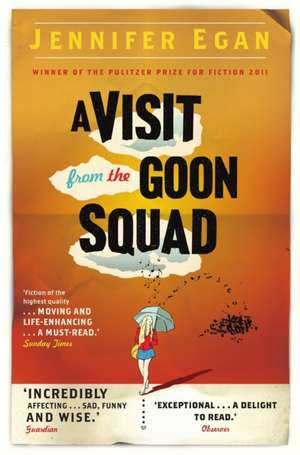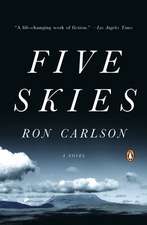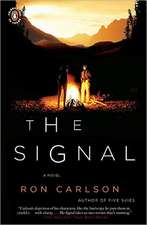A Visit from the Goon Squad: Waterstones Reading the 21st Century
Autor Jennifer Eganen Limba Engleză Paperback – 9 iun 2011
Jennifer Egan's spellbinding novel circles the lives of Bennie Salazar, an ageing former punk rocker and record executive, and Sasha, the passionate, troubled young woman he employs. Although Bennie and Sasha never discover each other's pasts, the reader does, in intimate detail, along with the secret lives of a host of other characters whose paths intersect with theirs, over many years, in locales as varied as New York, San Francisco, Naples, and Africa. We first meet Sasha in her mid-thirties, on her therapist's couch in New York City, confronting her long-standing compulsion to steal.
Later, we learn the genesis of her turmoil when we see her as the child of a violent marriage, then a runaway living in Naples, then as a college student trying to avert the suicidal impulses of her best friend. We meet Bennie Salazar at the melancholy nadir of his adult life-divorced, struggling to connect with his nine-year-old son, listening to a washed up band in the basement of a suburban house-and then revisit him in 1979, at the height of his youth, shy and tender, revelling in San Francisco's punk scene as he discovers his ardour for rock and roll and his gift for spotting talent. We learn what became of his high school gang-who thrived and who faltered-and we encounter Lou Kline, Bennie's catastrophically careless mentor, along with the lovers and children left behind in the wake of Lou's far flung sexual conquests and meteoric rise and fall.
A Visit from the Goon Squad is a book about the interplay of time and music, about survival, about the stirrings and transformations set inexorably in motion by even the most passing conjunction of our fates. In a breathtaking array of styles and tones ranging from tragedy to satire to Powerpoint, Egan captures the undertow of self-destruction that we all must either master or succumb to; the basic human hunger for redemption; and the universal tendency to reach for both-and escape the merciless progress of time-in the transporting realms of art and music. Sly, startling, exhilarating work from one of our boldest writers.
| Toate formatele și edițiile | Preț | Express |
|---|---|---|
| Paperback (3) | 50.05 lei 3-5 săpt. | +26.97 lei 6-12 zile |
| Little Brown Book Group – 9 iun 2011 | 50.05 lei 3-5 săpt. | +26.97 lei 6-12 zile |
| Anchor Books – 28 feb 2011 | 70.55 lei 3-5 săpt. | +14.33 lei 6-12 zile |
| Large Print Press – 31 mar 2012 | 102.23 lei 3-5 săpt. | |
| Hardback (1) | 205.71 lei 3-5 săpt. | |
| Knopf Publishing Group – 31 mai 2010 | 205.71 lei 3-5 săpt. |
Din seria Waterstones Reading the 21st Century
-
 Preț: 74.85 lei
Preț: 74.85 lei - 15%
 Preț: 81.47 lei
Preț: 81.47 lei -
 Preț: 38.86 lei
Preț: 38.86 lei - 14%
 Preț: 56.55 lei
Preț: 56.55 lei - 22%
 Preț: 49.95 lei
Preț: 49.95 lei - 6%
 Preț: 55.47 lei
Preț: 55.47 lei - 23%
 Preț: 49.51 lei
Preț: 49.51 lei - 19%
 Preț: 69.83 lei
Preț: 69.83 lei - 27%
 Preț: 51.02 lei
Preț: 51.02 lei - 22%
 Preț: 55.36 lei
Preț: 55.36 lei - 15%
 Preț: 59.94 lei
Preț: 59.94 lei - 15%
 Preț: 109.57 lei
Preț: 109.57 lei -
 Preț: 71.62 lei
Preț: 71.62 lei - 24%
 Preț: 53.43 lei
Preț: 53.43 lei - 22%
 Preț: 50.40 lei
Preț: 50.40 lei - 30%
 Preț: 49.75 lei
Preț: 49.75 lei - 20%
 Preț: 57.69 lei
Preț: 57.69 lei - 21%
 Preț: 56.42 lei
Preț: 56.42 lei - 33%
 Preț: 34.87 lei
Preț: 34.87 lei - 22%
 Preț: 50.99 lei
Preț: 50.99 lei - 21%
 Preț: 67.38 lei
Preț: 67.38 lei - 22%
 Preț: 56.07 lei
Preț: 56.07 lei - 17%
 Preț: 41.51 lei
Preț: 41.51 lei - 24%
 Preț: 48.23 lei
Preț: 48.23 lei -
 Preț: 70.07 lei
Preț: 70.07 lei -
 Preț: 69.20 lei
Preț: 69.20 lei - 16%
 Preț: 47.67 lei
Preț: 47.67 lei - 14%
 Preț: 56.24 lei
Preț: 56.24 lei -
 Preț: 67.10 lei
Preț: 67.10 lei -
 Preț: 69.07 lei
Preț: 69.07 lei - 22%
 Preț: 50.81 lei
Preț: 50.81 lei - 16%
 Preț: 58.59 lei
Preț: 58.59 lei -
 Preț: 58.49 lei
Preț: 58.49 lei - 41%
 Preț: 43.05 lei
Preț: 43.05 lei -
 Preț: 56.83 lei
Preț: 56.83 lei -
 Preț: 82.33 lei
Preț: 82.33 lei - 23%
 Preț: 44.35 lei
Preț: 44.35 lei -
 Preț: 51.44 lei
Preț: 51.44 lei -
 Preț: 57.14 lei
Preț: 57.14 lei -
 Preț: 70.22 lei
Preț: 70.22 lei - 25%
 Preț: 47.53 lei
Preț: 47.53 lei - 20%
 Preț: 41.86 lei
Preț: 41.86 lei - 22%
 Preț: 55.98 lei
Preț: 55.98 lei - 23%
 Preț: 49.60 lei
Preț: 49.60 lei - 23%
 Preț: 39.67 lei
Preț: 39.67 lei - 21%
 Preț: 56.51 lei
Preț: 56.51 lei -
 Preț: 73.70 lei
Preț: 73.70 lei - 23%
 Preț: 53.77 lei
Preț: 53.77 lei - 45%
 Preț: 39.19 lei
Preț: 39.19 lei -
 Preț: 69.72 lei
Preț: 69.72 lei
Preț: 50.05 lei
Preț vechi: 64.46 lei
-22% Nou
9.58€ • 9.100$ • 7.93£
Carte disponibilă
Livrare economică 14-28 martie
Livrare express 27 februarie-05 martie pentru 36.96 lei
Specificații
ISBN-10: 1780330960
Pagini: 351
Dimensiuni: 126 x 196 x 28 mm
Greutate: 0.31 kg
Editura: Little Brown Book Group
Colecția Corsair
Seria Waterstones Reading the 21st Century
Notă biografică
Extras
Found Objects
It began the usual way, in the bathroom of the Lassimo Hotel. Sasha was adjusting her yellow eye shadow in the mirror when she noticed a bag
on the floor beside the sink that must have belonged to the woman
whose peeing she could faintly hear through the vaultlike door of a toilet stall. Inside the rim of the bag, barely visible, was a wallet made of pale green leather. It was easy for Sasha to recognize, looking back, that the peeing woman's blind trust had provoked her: We live in a city where people will steal the hair off your head if you give them half a chance, but you leave your stuff lying in plain sight and expect it to be waiting for you when you come back? It made her want to teach the woman a lesson. But this wish only camouflaged the deeper feeling Sasha always had: that at, tender wallet, offering itself to her hand-it seemed so dull, so life-as-usual to just leave it there rather than seize the moment, accept the challenge, take the leap, fly the coop, throw caution to the wind, live dangerously ("I get it," Coz, her therapist, said), and take the fucking thing.
"You mean steal it."
He was trying to get Sasha to use that word, which was harder to avoid in the case of a wallet than with a lot of the things she'd lifted over the past year, when her condition (as Coz referred to it) had begun to accelerate: five sets of keys, fourteen pairs of sunglasses, a child's striped scarf, binoculars, a cheese grater, a pocketknife, twenty-eight bars of soap, and eighty-five pens, ranging from cheap ballpoints she'd used to sign debit-card slips to the aubergine Visconti that cost two hundred sixty dollars online, which she'd lifted from her former boss's lawyer during a contracts meeting. Sasha no longer took anything from stores-their cold, inert goods didn't tempt her. Only from people.
"Okay," she said. "Steal it."
Sasha and Coz had dubbed that feeling she got the "personal challenge," as in: taking the wallet was a way for Sasha to assert her toughness, her individuality. What they needed to do was switch things around in her head so that the challenge became not taking the wallet but leaving it. That would be the cure, although Coz never used words like "cure." He wore funky sweaters and let her call him Coz, but he was old school inscrutable, to the point where Sasha couldn't tell if he was gay or straight, if he'd written famous books, or if (as she sometimes suspected) he was one of those escaped cons who impersonate surgeons and wind
up leaving their operating tools inside people's skulls. Of course, these questions could have been resolved on Google in less than a minute, but they were useful questions (according to Coz), and so far, Sasha had resisted.
The couch where she lay in his office was blue leather and very soft. Coz liked the couch, he'd told her, because it relieved them both of the burden of eye contact. "You don't like eye contact?" Sasha had asked. It seemed like a weird thing for a therapist to admit.
"I find it tiring," he'd said. "This way, we can both look where we want."
"Where will you look?"
He smiled. "You can see my options."
"Where do you usually look? When people are on the couch."
"Around the room," Coz said. "At the ceiling. Into space."
"Do you ever sleep?"
"No."
Sasha usually looked at the window, which faced the street, and tonight, as she continued her story, was rippled with rain. She'd glimpsed the wallet, tender and overripe as a peach. She'd plucked it from the woman's bag and slipped it into her own small handbag, which she'd zipped shut before the sound of peeing had stopped. She'd flicked open the bathroom door and floated back through the lobby to the bar. She and the wallet's owner had never seen each other.
Prewallet, Sasha had been in the grip of a dire evening: lame date (yet another) brooding behind dark bangs, sometimes glancing at the flat-screen TV, where a Jets game seemed to interest him more than Sasha's admittedly overhandled tales of Bennie Salazar, her old boss, who was famous for founding the Sow's Ear record label and who also (Sasha happened to know) sprinkled gold flakes into his coffee-as an aphrodisiac, she suspected-and sprayed pesticide in his armpits.
Postwallet, however, the scene tingled with mirthful possibility. Sasha felt the waiters eyeing her as she sidled back to the table holding her handbag with its secret weight. She sat down and took a sip of her Melon Madness Martini and cocked her head at Alex. She smiled her yes/no smile. "Hello," she said.
The yes/no smile was amazingly effective.
"You're happy," Alex said.
"I'm always happy," Sasha said. "Sometimes I just forget."
Alex had paid the bill while she was in the bathroom-clear proof that he'd been on the verge of aborting their date. Now he studied her. "You feel like going somewhere else?"
They stood. Alex wore black cords and a white button-up shirt. He was a legal secretary. On e-mail he'd been fanciful, almost goofy, but in person he seemed simultaneously anxious and bored. She could tell that he was in excellent shape, not from going to the gym but from being young enough that his body was still imprinted with whatever sports he'd played in high school and college. Sasha, who was thirty-five, had passed that point. Still, not even Coz knew her real age. The closest anyone had come to guessing it was thirty-one, and most put her in her twenties. She worked out daily and avoided the sun. Her online profiles all listed her as twenty-eight.
As she followed Alex from the bar, she couldn't resist unzipping her purse and touching the fat green wallet just for a second, for the contraction it made her feel around her heart.
"You're aware of how the theft makes you feel," Coz said. "To the point where you remind yourself of it to improve your mood. But do you think about how it makes the other person feel?"
Sasha tipped back her head to look at him. She made a point of doing this now and then, just to remind Coz that she wasn't an idiot-she knew the question had a right answer. She and Coz were collaborators, writing a story whose end had already been determined: she would get well. She would stop stealing from people and start caring again about the things that had once guided her: music; the network of friends she'd made when she first came to New York; a set of goals she'd scrawled on a big sheet of newsprint and taped to the walls of her early apartments:
Find a band to manage
Understand the news
Study Japanese
Practice the harp
"I don't think about the people," Sasha said.
"But it isn't that you lack empathy," Coz said. "We know that, because of the plumber."
Sasha sighed. She'd told Coz the plumber story about a month ago, and he'd found a way to bring it up at almost every session since. The plumber was an old man, sent by Sasha's landlord to investigate a leak in the apartment below hers. He'd appeared in Sasha's doorway, tufts of gray on his head, and within a minute-boom-he'd hit the floor and crawled under her bathtub like an animal fumbling its way into a familiar hole. The fingers he'd groped toward the bolts behind the tub were grimed to cigar stubs, and reaching made his sweatshirt hike up, exposing a soft white back. Sasha turned away, stricken by the old man's abasement, anxious to leave for her temp job, except that the plumber was talking to her, asking about the length and frequency of her showers. "I never use it," she told him curtly. "I shower at the gym." He nodded without acknowledging her rudeness, apparently used to it. Sasha's nose began to prickle; she shut her eyes and pushed hard on both temples.
Opening her eyes, she saw the plumber's tool belt lying on the floor at her feet. It had a beautiful screwdriver in it, the orange translucent handle gleaming like a lollipop in its worn leather loop, the silvery shaft sculpted, sparkling. Sasha felt herself contract around the object in a single yawn of appetite; she needed to hold the screwdriver, just for a minute. She bent her knees and plucked it noiselessly from the belt. Not a bangle jangled; her bony hands were spastic at most things, but she was good at this-made for it, she often thought, in the first drifty moments after lifting something. And once the screwdriver was in her hand, she felt instant relief from the pain of having an old soft-backed man snuffling under her tub, and then something more than relief: a blessed indifference, as if the very idea of feeling pain over such a thing were baffling.
"And what about after he'd gone?" Coz had asked when Sasha told him the story. "How did the screwdriver look to you then?"
There was a pause. "Normal," she said.
"Really. Not special anymore?"
"Like any screwdriver."
Sasha had heard Coz shift behind her and felt something happen in the room: the screwdriver, which she'd placed on the table (recently supplemented with a second table) where she kept the things she'd lifted, and which she'd barely looked at since, seemed to hang in the air of Coz's office. It floated between them: a symbol.
"And how did you feel?" Coz asked quietly. "About having taken it from the plumber you pitied?"
How did she feel? How did she feel? There was a right answer, of course. At times Sasha had to fight the urge to lie simply as a way of depriving Coz of it.
"Bad," she said. "Okay? I felt bad. Shit, I'm bankrupting myself to pay for you-obviously I get that this isn't a great way to live."
More than once, Coz had tried to connect the plumber to Sasha's father, who had disappeared when she was six. She was careful not to indulge this line of thinking. "I don't remember him," she told Coz. "I have nothing to say." She did this for Coz's protection and her own- they were writing a story of redemption, of fresh beginnings and second chances. But in that direction lay only sorrow.
Sasha and Alex crossed the lobby of the Lassimo Hotel in the direction of the street. Sasha hugged her purse to her shoulder, the warm ball of wallet snuggled in her armpit. As they passed the angular budded branches by the big glass doors to the street, a woman zigzagged into their path. "Wait," she said. "You haven't seen-I'm desperate."
Sasha felt a twang of terror. It was the woman whose wallet she'd taken-she knew this instantly, although the person before her had nothing in common with the blithe, raven-haired wallet owner she'd pictured. This woman had vulnerable brown eyes and flat pointy shoes that clicked too loudly on the marble floor. There was plenty of gray in her frizzy brown hair.
Sasha took Alex's arm, trying to steer him through the doors. She felt his pulse of surprise at her touch, but he stayed put. "Have we seen what?" he said.
"Someone stole my wallet. My ID is gone, and I have to catch a plane tomorrow morning. I'm just desperate!" She stared beseechingly at both of them. It was the sort of frank need that New Yorkers quickly learn how to hide, and Sasha recoiled. It had never occurred to her that the woman was from out of town.
"Have you called the police?" Alex asked.
"The concierge said he would call. But I'm also wondering-could it have fallen out somewhere?" She looked helplessly at the marble floor around their feet. Sasha relaxed slightly. This woman was the type who annoyed people without meaning to; apology shadowed her movements even now, as she followed Alex to the concierge's desk. Sasha trailed behind.
"Is someone helping this person?" she heard Alex ask.
The concierge was young and spiky haired. "We've called the police," he said defensively.
Alex turned to the woman. "Where did this happen?"
"In the ladies' room. I think."
"Who else was there?"
"No one."
"It was empty?"
"There might have been someone, but I didn't see her."
Alex swung around to Sasha. "You were just in the bathroom," he said. "Did you see anyone?"
"No," she managed to say. She had Xanax in her purse, but she couldn't open her purse. Even with it zipped, she feared that the wallet would blurt into view in some way that she couldn't control, unleashing a cascade of horrors: arrest, shame, poverty, death.
Alex turned to the concierge. "How come I'm asking these questions instead of you?" he said. "Someone just got robbed in your hotel. Don't you have, like, security?"
The words "robbed" and "security" managed to pierce the soothing backbeat that pumped through not just the Lassimo but every hotel like it in New York City. There was a mild ripple of interest from the lobby.
"I've called security," the concierge said, adjusting his neck. "I'll call them again."
Sasha glanced at Alex. He was angry, and the anger made him recognizable in a way that an hour of aimless chatter (mostly hers, it was true) had not: he was new to New York. He came from someplace smaller. He had a thing or two to prove about how people should treat one another.
Two security guys showed up, the same on TV and in life: beefy guys whose scrupulous politeness was somehow linked to their willingness to crack skulls. They dispersed to search the bar. Sasha wished feverishly that she'd left the wallet there, as if this were an impulse she'd barely resisted.
"I'll check the bathroom," she told Alex, and forced herself to walk slowly around the elevator bank. The bathroom was empty. Sasha opened her purse, took out the wallet, unearthed her vial of Xanax, and popped one between her teeth. They worked faster if you chewed them. As the caustic taste flooded her mouth, she scanned the room, trying to decide where to ditch the wallet: In the stall? Under the sink? The decision paralyzed her. She had to do this right, to emerge unscathed, and if she could, if she did-she had a frenzied sense of making a promise to Coz.
The bathroom door opened, and the woman walked in. Her frantic eyes met Sasha's in the bathroom mirror: narrow, green, equally frantic. There was a pause, during which Sasha felt that she was being confronted; the woman knew, had known all along. Sasha handed her the wallet. She saw, from the woman's stunned expression, that she was wrong.
Recenzii
—Will Blythe, The New York Times Book Review (cover review)
“If Jennifer Egan is our reward for living through the self-conscious gimmicks and ironic claptrap of postmodernism, then it was all worthwhile. . . . A deeply humane story about growing up and growing old in a culture corroded by technology and marketing. . . . [A] triumph of technical bravado and tender sympathy. . . . Here, in ways that surprise and delight again, she transcends slick boomer nostalgia and offers a testament to the redemptive power of raw emotion in an age of synthetic sound and glossy avatars. Turn up the music, skip the college reunion and curl up with The Goon Squad instead.”
—Ron Charles, The Washington Post
“It may be the smartest book you can get your hands on this summer.”
—Carolyn Kellogg, The Los Angeles Times
“[A] spiky, shape-shifting new book. . . . A display of Ms. Egan’s extreme virtuosity.”
—Janet Maslin, The New York Times
“Jennifer Egan is a rare bird: an experimental writer with a deep commitment to character, whose fiction is at once intellectually stimulating and moving. . . . It’s a tricky book, but in the best way. When I got to the end, I wanted to start from the top again immediately, both to revisit the characters and to understand better how the pieces fit together. Like a masterful album, this one demands a replay.”
—Malena Watrous, The San Francisco Chronicle
“For all its postmodern flourishes, Goon Squad is as traditional as a Dickens novel. . . . Her aim is not so much to explode traditional storytelling as to explore how it responds to the pressures and opportunities of the digital age. Egan herself does not appear to be on Facebook, but A Visit From the Goon Squad will likely make her many new friends.”
—Jennie Yabroff, Newsweek
“Jennifer Egan’s A Visit from the Goon Squad is a singular work of fiction in both senses of the word. It’s as if the author has taken an epic novel covering five decades and expertly filleted it, casting aside excess characters and years to come away with a narrative that is wide-ranging but remarkably focused. . . . Vibrant and winning. . . . While this is occasionally a wistful book, it isn’t’ sad. Each narrative disorientation and subsequent reorientation reminds us of how we weave in and out of one another’s lives, staying connected through memory—our shield against the goon squad. By the time we get to the last page of Egan’s book . . . we’re left wanting more.”
—Marty Pols, Time
“Clever. Edgy. Groundbreaking. . . . For all of its cool, languid, arched-eyebrow sophistication—that’s the part that will make you think ‘Didion’—and for all of the glitteringly gorgeous sentences that flit through its pages like exotic fish—that’s the DeLillo part—the novel is actually a sturdy, robust, old-fashioned affair. It features characters about whom you come to care deeply as you watch them doing things they shouldn't, acting gloriously, infuriatingly human.”
—Julia Keller, The Chicago Tribune
“Jennifer Egan has accomplished the tricky feat of using metafiction techniques without sacrificing old-fashioned story-telling. . . . A Visit from the Goon Squad has a circuitous structure that seems almost designed for our Internet rewired brains.”
—Steven Kurutz, The Wall Street Journal
“Expect to inhale Jennifer Egan’s A Visit From the Goon Squad. Then expect it to lodge in your cranium and your breastbone a good long while. I expect this brilliant, inventive novel to become enshrined. Such rash speculation is foolish, I know—we live amid a plague of bloated praise. But A Visit From the Goon Squad is emboldening. It cracks the world open afresh . . . Would that Marcel Proust could receive A Visit From the Goon Squad. It would blow his considerable mind.”
—Karen R. Long, Cleveland Plain Dealer
“Expect to inhale Jennifer Egan’s A Visit From the Goon Squad. Then expect it to lodge in your cranium and your breastbone a good long while. I expect this brilliant, inventive novel to become enshrined. Such rash speculation is foolish, I know—we live amid a plague of bloated praise. But A Visit From the Goon Squad is emboldening. It cracks the world open afresh . . . Would that Marcel Proust could receive A Visit From the Goon Squad. It would blow his considerable mind.”
—Karen R. Long, Cleveland Plain Dealer
“In her audacious, extraordinary fourth novel, A Visit from the Goon Squad, Jennifer Egan uses the pop-music business as a prism to examine the heedless pace of modern life, generational impasses, and the awful gravity of age and entropy. . . . A Visit from the Goon Squad is fascinating for its daring scope and fractured narrative, but along the way, Egan crafts some brilliant scenes. . . . A rich and rewarding novel.”
—David Hiltbrand, Philadelphia Inquierer
“Grounded in the passions and frustrations of a record producer and his nervy assistant, Jennifer Egan’s bravura fifth book, A Visit from the Goon Squad, samples from different eras (the glory days of punk; a slick, socially networked future) and styles (sly satire, moving tragedy, even PowerPoint) to explore the interplay between music and the rough rhythms of life.”
—Megan O’Grady, Vogue
“Wildly ambitious. . . . A tour de force. . . . Music is both subject and metaphor as Egan explores the mutability of time, destiny, and individual accountability post-technology.”
—Liza Nelson, O, The Oprah Magazine
“A Visit from the Goon Squad [is] an exhilarating, big-hearted, three-headed beast of a story. . . . [A] genius as a writer. . . . We see ourselves in all of Egan’s characters because their stories of heartbreak and redemption seem so real they could be our own, regardless of the soundtrack. Such is the stuff great novels are made of.”
—Kimberly Cutter, Marie-Claire
“[Egan is] a boldly intellectual writer who is not afraid to apply her equally powerful intuitive skills to her ambitious projects. . . . While it’s a time-trekking, tech-freakin’ doozie, the characters’ lives and fates claim the story first and foremost, and we are pulled right in. . . . Brilliantly structured, with storylike chapters.”
—Lisa Shea, Elle
“[A] slamming multi-generational San Francisco family saga.”
—Elissa Schappell, Vanity Fair
“Frequently dazzling. . . . Egan’s expert flaying of human foibles has the compulsive allure of poking at a sore tooth: excruciating but exhilarating too. A-”
—Leah Greenblatt, Entertainment Weekly
“Remarkable . . . A finely braided meditation on time, memory, pop culture, and the perils of growing up in America.”
—Paul Vidich, Narrative Magazine
“Poignant. . . . A nice reminder that even in the age of Kindles and Facebook, ambitious fiction is still one of the best tools available to help us understand the rapidly changing world. . . . Her startling, apocalyptic take on the near future is all the more chilling for its utter plausibility, and brings the realization that Egan was up to much more here than just trying to reinvent the novel's format. You’ll want to recommend it to all your Facebook friends.”
—Patrick Condon, Associated Press
“Forget what literati the world over say about the demise of the “big” novel, the kind that patiently threads its way through the tangled knot of humankind’s shared urges, fears, frailties and joys. A Visit from the Goon Squad admittedly cannot be described either as a novel or a collection of short stories, but it is a great work of fiction, a profound and glorious exploration of the fullness and complexity of the human condition. . . . An extraordinary new work of fiction.”
—Rayyan Al-Shawaf, The New York Press
“Poetry and pathos . . . Egan conveys personality so swiftly and with such empathy. . . . Yet she is not a conventional dystopian novelist; distinctions between the virtual and the real may be breaking down in this world, but her characters have recognizable emotions and convictions, which is why their compromises and uncertainties continue to move us. . . . Another ambitious change of pace from talented and visionary Egan, who reinvents the novel for the 21st century while affirming its historic values.”
—Kirkus Reviews (starred review)
“Egan is a writer of cunning subtlety, embedding within the risky endeavors of seductively complicated characters a curious bending of time . . . a hilarious melancholy, enrapturing, unnerving, and piercingly beautiful mosaic of a novel.”
—Donna Seaman, Booklist (starred review)
“The star-crossed marriage of lucid prose and expertly deployed postmodern switcheroos that helped shoot Egan to the top of the genre bending new school is alive and well in this graceful yet wild novel . . . powerful.”
—Publishers Weekly (starred review)
“Well-defined characters and an engaging narrative. . . . Readers will enjoy seeing the disparate elements of this novel come full circle.”
—Gwen Vredevoogd, Library Journal






















